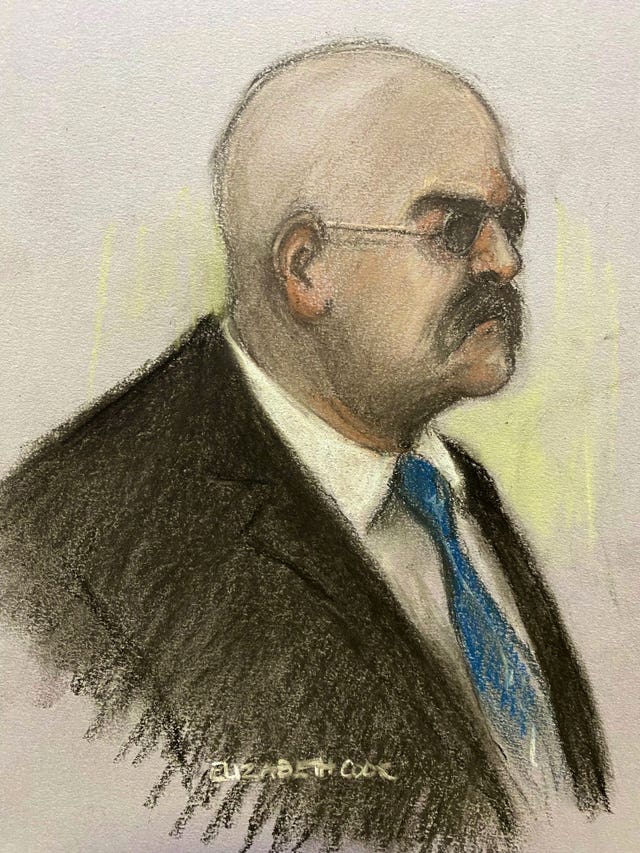Notorious inmate Charles Bronson’s latest parole hearing to be held in private
Bronson was the first prisoner to formally ask for a public hearing after rules changed in 2022.

Notorious prisoner Charles Bronson’s latest parole hearing will be held in private, a judicial Parole Board member has decided.
The decision comes after one of the UK’s longest-serving prisoners – who changed his surname to Salvador in 2014 – took part in one of the country’s first public parole hearings in 2023.
On Tuesday, a document was published in which judicial Parole Board member Jeremy Roberts KC, on behalf of the board chair, said he had not granted the application for the 72-year-old’s parole hearing to be made public.
Once one of Britain’s most violent offenders, Bronson has spent most of the past 48 years behind bars – apart from two brief periods during which he reoffended – for a string of thefts, firearms and violent offences, including 11 hostage-taking incidents in nine different sieges.

Victims included prison governors, doctors, staff and, on one occasion, his own solicitor.
Bronson – whose real name is Michael Peterson and who has been diagnosed with anti-social personality disorder – was handed a discretionary life sentence with a minimum term of four years in 2000 for taking a prison teacher at HMP Hull hostage for 44 hours. Since then, the Parole Board has repeatedly refused to direct his release.
The 2023 parole review was his eighth.
Bronson was the first prisoner to formally ask for a public hearing after rules changed in 2022 in a bid to remove the secrecy around the parole process.
In the document published on Tuesday, Mr Roberts said the application for a public hearing was made on February 9 by the prisoner’s solicitor.
Representations on Bronson’s behalf said he “feels that he is directly responsible for the change in law and Parole Board rules and so he should be allowed to participate in a public hearing”.
He has a “legitimate expectation that his subsequent parole hearings will be held in public following his lengthy proceedings to instigate the change in the rules”.
Mr Roberts said the fact that Bronson is responsible for the change in the law “does not give him any legitimate expectation that his subsequent hearings will be held in public”.
Bronson’s solicitor added that the prisoner “is not vulnerable and, given his wish for a public hearing”, it could cause him “undue emotional stress” if the hearing was not held in public.
They added: “He believes he will achieve best evidence and this will not be impacted by the hearing being in public.”
But Mr Roberts said: “The prisoner is obviously highly intelligent (albeit liable to some eccentric beliefs and attitudes) and I do not think it likely that he would suffer undue emotional stress if this hearing is held privately.
“I am sure that he will be able to ‘give best evidence’ whether the hearing is held in public or in private.”
Bronson’s solicitor also said the Parole Board’s work is often not well understood by the public and “there is a public interest in increasing understanding”.
The solicitor added that Bronson “believes that his risk has significantly reduced” and that a “discussion about risk and risk reduction in a public hearing would aid public confidence”.
Mr Roberts agreed that “there is a public interest in increasing the public’s understanding of the parole process and that transparency, where possible, is important for public confidence in the system”.
He also said the Parole Board has over the last few years made “great efforts” to improve the transparency of its proceedings.
Mr Roberts said the introduction of public hearings is another step taken.
But he added: “However, public hearings and the arrangements for them are expensive and time-consuming, and unless and until the board is provided with the necessary funds to carry them out in more cases it must be selective in the holding of a public hearing only where it is likely to increase public understanding of the process or will benefit the public or victims in some other way.”
The Secretary of State’s representations were provided on her behalf by a senior official in the Ministry of Justice, which said Bronson’s “readiness to resort to violence continues to be evident, and the Secretary of State is concerned that a public hearing would prompt a display of violence in a way that a private hearing might not”.
Mr Roberts said there has been a “marked improvement in recent years in the prisoner’s attitudes to (and relationships with) prison staff”.
The panel chair’s observations were included in the document, in which they said they were concerned there may be “a real possibility that the prisoner’s application for a public hearing might be driven by a desire on his part to maintain notoriety or to achieve greater notoriety, or to air grievances publicly, rather than to increase public understanding of the parole process”.
But Mr Roberts said he is “prepared to believe that his current intentions are entirely genuine even if (as is likely) there is an element of attention-seeking in his application”.
Mr Roberts said he does not believe holding the hearing in public would be likely to increase public awareness of the parole system, and people who observed Bronson’s previous hearing have been able to see how the system operated in that case.
He added: “I believe that the notoriety which the prisoner has already achieved and which would no doubt be increased by holding this hearing in public might actually mitigate against better public understanding of the parole process. It might distract from the real issues in the case.”
Mr Roberts decided that the points against a public hearing “substantially outweigh” those in favour.





